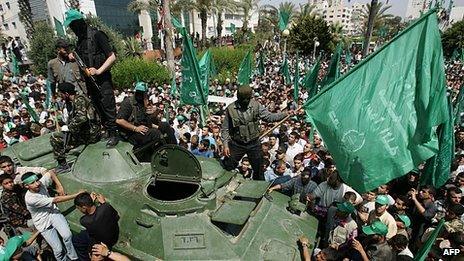Palestinian split: Views from Hamas and Fatah, six years on
- Published

It is six years since the violent split between the main Palestinian political factions, Fatah and Hamas.
Tensions between the two intensified after the Islamist group, Hamas, won legislative elections in 2006. Hamas is listed as a terrorist organisation by Israel, the United States, the European Union, Canada and Japan. After the vote, sanctions were imposed on the Palestinians and foreign aid was suspended.
In 2007, there was prolonged fighting in the Gaza Strip which left dozens dead. On 14 June, President Mahmoud Abbas dissolved the government. His Fatah faction was left in control of the Palestinian Authority which rules in the West Bank and Hamas has since governed Gaza.
The political rift has compounded the geographical division of the Palestinian people and is a source of deep anger and frustration. The BBC's Yolande Knell went to meet two politicians who found themselves on the wrong side of the divide.
Faisal Abu Shahla, elected Palestinian Legislative Council (PLC) member for Fatah, in Gaza City
I consider what happened six years ago, ending on 14 June 2007, as the second Nakba (Catastrophe) for the Palestinians [after the first in 1948 when hundreds of thousands fled or were displaced from their homes with the war that followed Israel's declaration of independence].
This was the first time there was such a split in Palestinian society. Usually the Palestinians are unified and we don't take notice of our religious differences or differences of origin. We are a good mixture.
The coup divided Gaza and the West Bank and it weakened the Palestinian cause. The power which occupies our lands, Israel, was the one to benefit from our weakness.
I was in Gaza doing my duties as a parliamentarian. There were already conflicting opinions between Hamas and Fatah. Hamas was unable to manage the government and pay the salaries and get recognition from the European [donor] countries and international organisations. This led to the clashes. Hamas decided to use violence and force to end the conflict.
I'm originally from Gaza and I live in Gaza City. I decided to stay, not to leave my family, my house and my friends. I refused many offers to move to the West Bank.
It wasn't easy at all. Since the coup Fatah has been considered a prohibited party in Gaza. We don't want to reopen the old file but many [Fatah leaders in Gaza] were taken to jail and exposed to violence, their houses were taken and even their furniture and cars. I had some immunity because I am an elected member of the PLC. It's easier now but we still cannot open our offices or get back some of our properties.
I don't like to talk about the past, I like to talk about the future because we want reconciliation. We signed an agreement in May 2011 and the Doha Declaration in February 2012 but unfortunately it wasn't implemented at that time.
The last meeting was on 14 May in Egypt when both parties agreed to implement certain steps to promote reconciliation within three months. By 14 August we should have a unity government and fix the date for elections. I am hopeful about it.
At the time of the split I was in the [Israeli] jail because just a few months after the 2006 elections dozens of PLC members and ministers were arrested here in the West Bank.
We heard the news in the prison and then our colleagues in the Gaza Strip told us they had earlier sent letters to Abu Mazen [the Palestinian Authority President Mahmoud Abbas] to complain about the actions of [then Fatah leader in Gaza] Mohammed Dahlan but he didn't take it seriously. In my opinion Mohammed Dahlan had a big plan to remove the roots of Hamas, the resistance, in Gaza and the West Bank.
The plan failed in the Gaza Strip but it is succeeding in the West Bank. I was released from jail in 2010, eight months after that Israel arrested me again for one year and I was held in administrative detention. Six years after the split they [Israel and the Palestinian security services] are still arresting people. We have our homes and cars searched. There is no immunity.
Life is full of difficulties. I am a PLC member and I can't open my office. They are stopping our work here in the West Bank. People who make contact with me get arrested.
We want a real reconciliation in the West Bank. Many times we reached a point of agreement and then everything fell apart again. Of course I hope that this new technocratic government comes to life. They say it will be independent but in my opinion there are no independent people in Palestine. People like one group or another.
I also want to see an election today - not tomorrow - but people must be free to give their votes to whomever they want if we are to have a democracy. I want citizens in the West Bank to feel safe. How can they when there are political prisoners? I need to give people guarantees that they will not be arrested however they vote.
In terms of the reconciliation, I know there is a veto from the United States of America and the European Union. There is pressure. It all affects the relations between the Palestinians. We can't trust the outside powers.